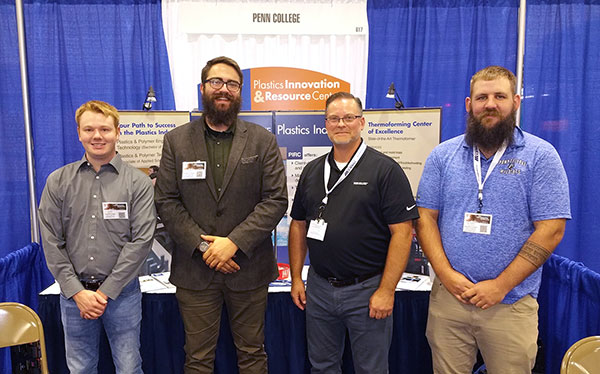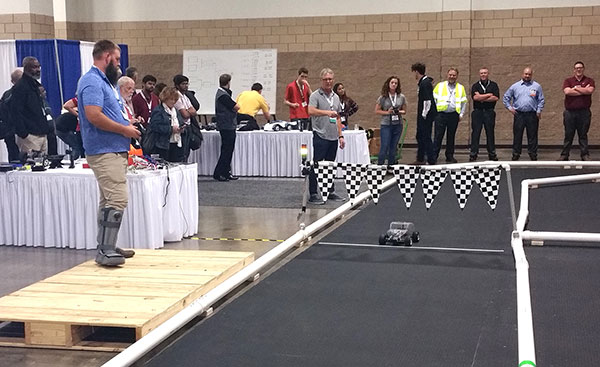Penn College plastics students network, compete at conference
Published 10.16.2018
News
Student News
Faculty & Staff
Polymer Engineering
PIRC
Industrial, Computing & Engineering Technologies News
Networking with industry leaders and participating in a remote-controlled car contest highlighted the activities of a trio of Pennsylvania College of Technology plastics students at the 26th Annual SPE Thermoforming Conference in Fort Worth, Texas.
Conducted by the Thermoforming Division of the Society of Plastics Engineers, the conference attracted over 70 exhibitors and offered several technical workshops. Thermoforming refers to the practice of heating a thermoplastic sheet until pliable and – by use of a vacuum – forming the sheet into a three-dimensional shape.
 Plastics and polymer engineering technology students Haven K. Bontz, of Cooperstown; Anthony P. Wagner, of Williamsport; and Joshua M. Worthing, of New Brighton, represented Penn College at the gathering. The students helped staff the college’s exhibitor booth and assisted PlastiVan personnel with science demonstrations for local middle and high school students.
Plastics and polymer engineering technology students Haven K. Bontz, of Cooperstown; Anthony P. Wagner, of Williamsport; and Joshua M. Worthing, of New Brighton, represented Penn College at the gathering. The students helped staff the college’s exhibitor booth and assisted PlastiVan personnel with science demonstrations for local middle and high school students.
They were accompanied by Christopher J. Gagliano, project manager of the college’s Plastics Innovation & Resource Center, a globally recognized leader in plastics education and training.
Bontz earned the trip as recipient of the Bill Benjamin Memorial Scholarship. Wagner and Worthing teamed for the conference’s RC Car Competition, which challenged them to design, thermoform and decorate a car body to be mounted on a sponsor-provided chassis for racing.
Wagner and Worthy employed Autodesk Inventor, a 3D computer-aided software program, to design the car’s body last spring. A 3D printer produced the design’s shell. To create the mold, the students packed the shell’s interior with HYVAC, a porous, easily shaped material. They drilled tiny vent holes through the shell and into the HYVAC to evacuate air trapped between the heated sheet and mold during the thermoforming process.
The students chose to decorate the car body with a camouflage graphic, which they applied via hydro-dipping. The process required a water and chemical mix, which transformed a film of the camouflage graphic’s image into “liquid ink.” Once they submerged the car body, the ink adhered to it.
 SPE officials judged the cars on presentation and complexity of thermoforming. The teams also raced against one another. Overall, the Penn College duo finished fourth out of eight teams.
SPE officials judged the cars on presentation and complexity of thermoforming. The teams also raced against one another. Overall, the Penn College duo finished fourth out of eight teams.
“The competition was a great educational experience for Anthony and Josh,” Gagliano said. “At times, it took them out of their comfort zone. And that is essential for growth in the field. The whole experience at the conference, from networking to learning from industry experts, was quite valuable.”
Penn College is one of six institutions nationwide offering plastics degrees that are accredited by the Engineering Technology Accreditation Commission of ABET. In addition to the bachelor’s degree in plastics and polymer engineering technology, the college offers an associate degree in plastics and polymer technology.
For more about plastics majors and other programs offered by the college’s School of Industrial, Computing & Engineering Technologies, call 570-327-4520.
For more about Penn College, a national leader in applied technology education and workforce development, email the Admissions Office or call toll-free 800-367-9222.
Conducted by the Thermoforming Division of the Society of Plastics Engineers, the conference attracted over 70 exhibitors and offered several technical workshops. Thermoforming refers to the practice of heating a thermoplastic sheet until pliable and – by use of a vacuum – forming the sheet into a three-dimensional shape.
 Plastics and polymer engineering technology students Haven K. Bontz, of Cooperstown; Anthony P. Wagner, of Williamsport; and Joshua M. Worthing, of New Brighton, represented Penn College at the gathering. The students helped staff the college’s exhibitor booth and assisted PlastiVan personnel with science demonstrations for local middle and high school students.
Plastics and polymer engineering technology students Haven K. Bontz, of Cooperstown; Anthony P. Wagner, of Williamsport; and Joshua M. Worthing, of New Brighton, represented Penn College at the gathering. The students helped staff the college’s exhibitor booth and assisted PlastiVan personnel with science demonstrations for local middle and high school students.They were accompanied by Christopher J. Gagliano, project manager of the college’s Plastics Innovation & Resource Center, a globally recognized leader in plastics education and training.
Bontz earned the trip as recipient of the Bill Benjamin Memorial Scholarship. Wagner and Worthing teamed for the conference’s RC Car Competition, which challenged them to design, thermoform and decorate a car body to be mounted on a sponsor-provided chassis for racing.
Wagner and Worthy employed Autodesk Inventor, a 3D computer-aided software program, to design the car’s body last spring. A 3D printer produced the design’s shell. To create the mold, the students packed the shell’s interior with HYVAC, a porous, easily shaped material. They drilled tiny vent holes through the shell and into the HYVAC to evacuate air trapped between the heated sheet and mold during the thermoforming process.
The students chose to decorate the car body with a camouflage graphic, which they applied via hydro-dipping. The process required a water and chemical mix, which transformed a film of the camouflage graphic’s image into “liquid ink.” Once they submerged the car body, the ink adhered to it.
 SPE officials judged the cars on presentation and complexity of thermoforming. The teams also raced against one another. Overall, the Penn College duo finished fourth out of eight teams.
SPE officials judged the cars on presentation and complexity of thermoforming. The teams also raced against one another. Overall, the Penn College duo finished fourth out of eight teams.“The competition was a great educational experience for Anthony and Josh,” Gagliano said. “At times, it took them out of their comfort zone. And that is essential for growth in the field. The whole experience at the conference, from networking to learning from industry experts, was quite valuable.”
Penn College is one of six institutions nationwide offering plastics degrees that are accredited by the Engineering Technology Accreditation Commission of ABET. In addition to the bachelor’s degree in plastics and polymer engineering technology, the college offers an associate degree in plastics and polymer technology.
For more about plastics majors and other programs offered by the college’s School of Industrial, Computing & Engineering Technologies, call 570-327-4520.
For more about Penn College, a national leader in applied technology education and workforce development, email the Admissions Office or call toll-free 800-367-9222.
Photos provided